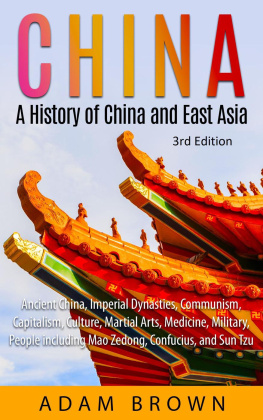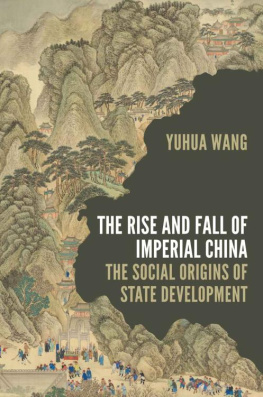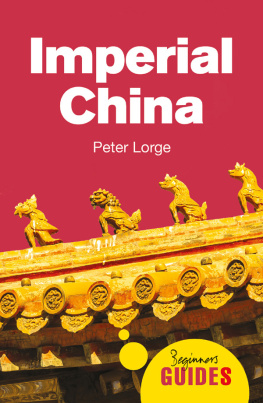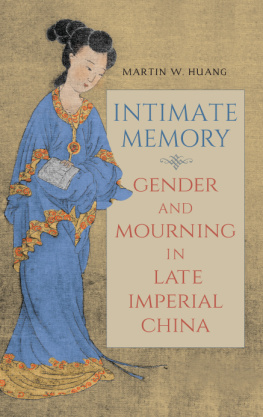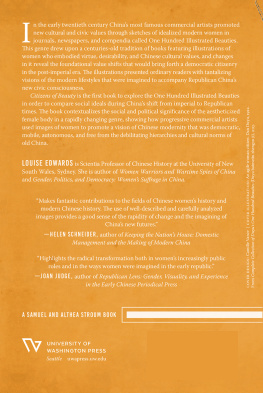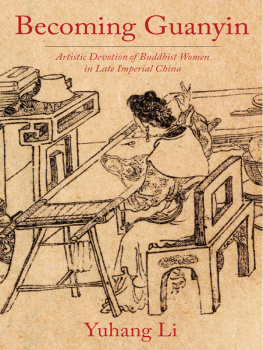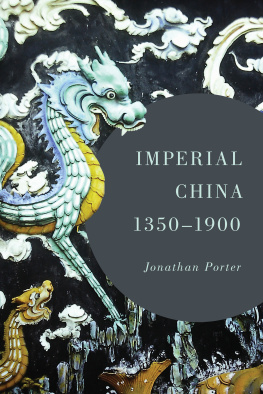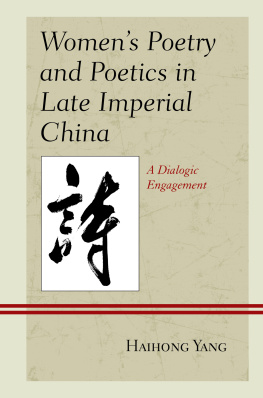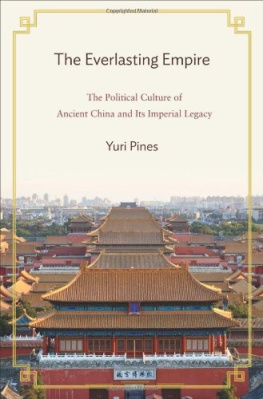Cover Credit
The cover design incorporates a Western portrait of Empress Dowager Cixi of the Qing Dynasty, dated 1905, by Hubert Vos (1855-1933). A digital rendition of the portrait was published on Wikimedia Commons, which gave the source as Two Years with the Empress by Yu Deling and noted that it was in the public domain, stating that the file has been identified as being free of known restrictions under copyright law, including all related and neighboring rights.
Copyright 2016 Priscilla Chung
ISBN: 978-1-4951-7063-8
Contact the author at
Readers Guide to Using This Book
Guide for the General Reader
This book focuses on the status and roles of women inChina, especially those who had a significant influence on governing theempire. In providing the background for its main theme, the book inevitablysummarizes the principal events and social development of China throughout theimperial period. Thus a reading of the books narrative from beginning to endwill serve as an introduction to the history of China, supplemented by anin-depth look at the often neglected role of the women in this generallypaternalistic society. It is not so much a look at Chinese history through thewindow of womens issues as it is a view of Chinese history with that windowopen. The section in the Introduction on the organization of the book explainshow the author has approached this task.
The general reader may be somewhat intimidated by thelarge number of notes and references. These are intended to provide furtherinformation and source material for academically oriented readers, and perhapsto assure the general reader that the narrative is well founded. Nevertheless,the book can be read without reliance on the notes. The reader who wants alittle more background can skim through the notes which are grouped by chapterat the back of the book. The notes that present supplementary information areeasily distinguished from those that are just citations of sources. The numberof each note is a link back to the point of the text where the reference to thenote is found, so it is easy to find the context for the information in thenote.
A few notes provide source information for several maps,and links to the maps are incorporated in the notes. These links also appearin the main text so that a map can be viewed without accessing the note. Alink in the caption of the map takes the reader back to the text where the mapwas cited.
As in any history, the names of both the principalpersonages and minor players are integral to the narrative. In this book, theChinese names are displayed in the Pinyin system of Romanization. Having somenotion of the sound of a name can help the reader remember it when it reappearsin the text. Those unfamiliar with Pinyin should note that there are excellentresources on the Internet that provide assistance with the pronunciation, suchas the MandarinChinese Pinyin Chart with Audio at chinese.yabla.com.
Guide for Teachers and Students
This is an introductory book that does not assume thereader is familiar with Chinese history. It therefore can be used as a textbook at the secondary school level, or as a companion text or elective readingfor a beginning Chinese history course, or a class in a womens studies programat a university. The book is unique in that it covers gender and ethnicity inthe context of Chinese history. There are academic works based on primaryresearch on these topics but they are written mostly for scholars in the fieldand are difficult for students to follow. The distinguishing characteristicsof Women and Power in Imperial China include:
- It is an introductory text on Chinese history focusing on gender.
- It is unusually comprehensive in covering its topic from pre-Imperial China to modern times.
- It includes discussion of both ethnic Han and non-Han cultures and the impact of their differences on women and power.
- It benefits from nine years of teaching experience by the author in teaching these subjects to undergraduates in two universities in Hong Kong.
The books elaboration of the means bywhich women obtained, exercised, and retained power in a society that wasformally ruled by a succession of male emperors illuminates the evolution of anumber of social issues. For example, the influence of the maternal relativesof the emperorinfluence that often extended to de facto rule of theempirewas countered by policies and practices that had far-reachingconsequences, such as the rise to power of the palace eunuchs when an emperor soughtallies in a conflict with these powerful relatives.
The changing role and status of women inimperial China was also a product of the changes that came with the successivewaves of conquest by nomadic peoples. As the book demonstrates, women in thenomadic societies had greater power and independence than in traditional HanChinese society. This was reflected at the highest levels in the influencethat women in the palace were able to exercise. Unfortunately, during these periodsof alien rule, this also resulted in changes in a number of the traditionalpractices of the subject people, such as the ownership of the marriage dowry. These changes tended to persist long after the Mandate of Heaven had moved onto a new Han dynasty or another nomadic conqueror. They often proveddetrimental to womens position in society and gave rise to such anomalies as encouraging widow suicide and praising it as a virtuous practice.
Throughout the centuries of social changeand development that constitute the fabric of Chinas rich history, we canidentify a number of persistent concerns and issues, such as the need toprovide for the imperial succession, the influence of maternal relatives on themanagement of the state, and relations between China and potential threats toits sovereignty, in which women played prominent and sometimes dominant roles.
In the Epilog, the author summarizes the changing status of women in China, discussing their role in areas such as religion, law, and imperial politics, and extends this analysis into the post-imperial period up to modern times.
Acknowledgement
I would like to thank the two universities in Hong Kongwhere I taughtthe Chinese University of Hong Kong (CUHK) and the Hong KongUniversity of Science and Technology (HKUST)for making this book possible. Ihad started with teaching at two universities in the United States, then wenton to work in university administration and other management positions. WhenProfessor Billy So gave me the opportunity to return to teaching, I had tocatch up on 20 years of reading and was pleasantly surprised and encouraged tofind that much has been written in the field of China regarding women and thatmy book, Palace Women of the Northern Sung, had been well read and citedover this period of time.
As I look back upon my life, I would like to give specialrecognition to the many who have helped me along and made my life rewarding inlearning, teaching and management positions. Apart from the professors whoguided me in my studies, I was fortunate to have my sister, Professor JuliaChing, baby-sit for me while I took my 24-hour research examination at theUniversity of Pennsylvania. She also made it possible for me to contribute tothe Sung Biographies, edited by Herbert Franke. On my graduation, ProfessorWinberg Chai recruited me as an Assistant Professor of Asian Studies at theCity College of New York. Family reasons necessitated a move to Honolulu and Iwas fortunate to meet Professor Daniel W.Y. Kwok at the University of Hawaii atManoa, who was kind enough to help me obtain a position as Visiting Scholar atthe History Department of the Manoa Campus where I was able to do research andwriting on my book on palace women. I owe enormous debts to both ProfessorsBrian McKnight and Daniel Kwok for the publication of the book. Brian read thedifferent drafts and I owe the success of the book to his advice andencouragement. Dan recommended that I approach E. J. Brill for the publicationof the book in the Toung Pao Monographies. I must also thank E. J. Brill forgiving me the digital rights on the book so that it could be published in Kindleformat.


